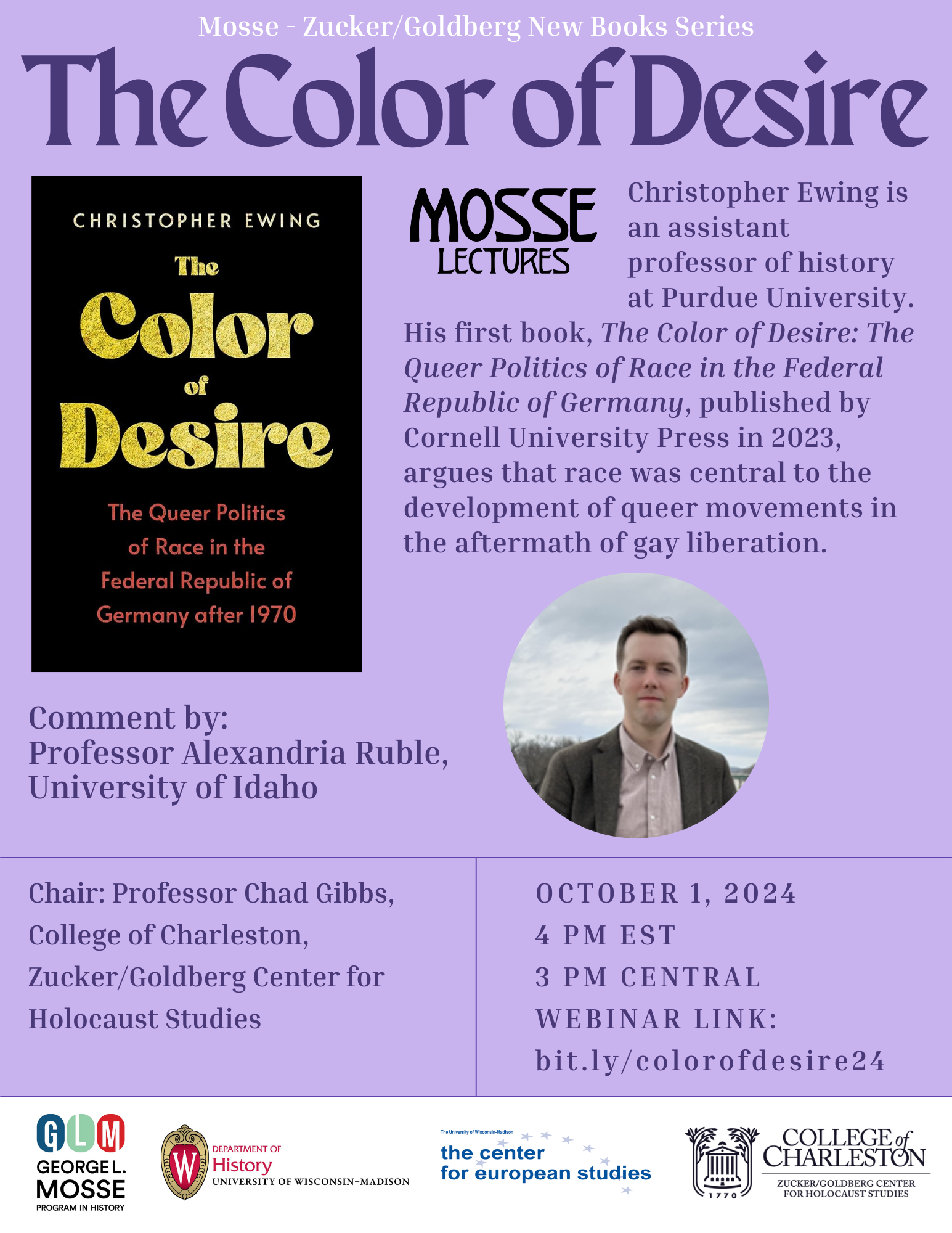Christopher Ewing, The Color of Desire: The Queer Politics of Race in the Federal Republic of Germany after 1970 (Ithaca, NY: Cornell University Press, 2024).
Tuesday, 1 October 2024, 15:00 CST
ZOOM
Chaired by Chad S.A. Gibbs (College of Charleston)
Comment by Alexandria Ruble (University of Idaho)
Sponsored by:
Mosse Lectures
George L. Mosse Program in History
College of Charleston Zucker/Goldberg Center for Holocaust Studies
Center for German & European Studies at the University of Wisconsin-Madison
University of Wisconsin-Madison Department of History
The Color of Desire tells the story of how, in the aftermath of gay liberation, race played a crucial role in shaping the trajectory of queer, German politics. Focusing on the Federal Republic of Germany, Christopher Ewing charts both the entrenchment of racisms within white, queer scenes and the formation of new, antiracist movements that contested overlapping marginalizations.
Far from being discrete political trajectories, racist and antiracist politics were closely connected, as activists worked across groups to develop their visions for queer politics. Ewing describes not only how AIDS workers, gay tourists, white lesbians, queer immigrants, and Black feminists were connected in unexpected ways but also how they developed contradictory concerns that comprised the full landscape of queer politics. Out of these connections, which often exceeded the bounds of the Federal Republic, arose new forms of queer fascism as well as their multiple, antiracist contestations. Both unsettled the appeals to national belonging, or “homonationalism,” on which many white queer activists based their claims. Thus, the story of the making of homonationalism is also the story of its unmaking.
The Color of Desire explains how the importance of racism to queer politics cannot—and should not—be understood without also attending to antiracism. Actors worked across different groups, making it difficult to chart separable political trajectories. At the same time, antiracist activists also used the fractures and openings in groups that were heavily invested in the logics of whiteness to formulate new, antiracist organizations and, albeit in constrained ways, shifted queer politics more generally.
Christopher Ewing is an assistant professor of history at Purdue University. His first book, The Color of Desire: The Queer Politics of Race in the Federal Republic of Germany, published by Cornell University Press in 2023, argues that race was central to the development of queer movements in the aftermath of gay liberation. He is currently developing a second project, From Gay Crimes to Hate Crimes: The Transnational History of the Violent 1990s, which answers the question of why the framework of “hate criminality” simultaneously became a useful way of making sense of a wide range of violences in multiple national contexts at the turn of the 1990s. His work on this project has been supported by the National Endowment for the Humanities, the University of North Texas Libraries, and the Open Society Archives of the Central European University, and in fall 2024 he will be a visiting fellow with the Humanities Research Center and Freilich Project for the Study of Bigotry at the Australian National University. His work has appeared in the Journal of the History of Sexuality, Sexualities, and Sexuality and Culture.
Alexandria N. Ruble is an assistant professor of European history. She earned her Ph.D. from the University of North Carolina at Chapel Hill in 2017. Her research focuses on twentieth-century Central Europe, Germany, Nazi Germany and the Holocaust, the Cold War, women’s and gender history, and legal history. Her first book, Entangled Emancipation: Women’s Rights in Cold War Germany was published by University of Toronto Press in 2023. Her second book project explores how political prisoners experienced persecution by the Nazis between 1933 and 1945, and how they reintegrated themselves into East and West German societies after 1945. Her work has been supported by the American Association of University Women, the US Holocaust Memorial Museum, the Fulbright US Student Program, and the German Academic Exchange Service, among others.
Chad S.A. Gibbs serves as Director of the Zucker/Goldberg Center for Holocaust Studies and Assistant Professor of Jewish Studies. He is a historian of the Holocaust, antisemitism, modern Germany, and war and society. Chad’s current project focuses on gender, geography, and social networks in Jewish resistance at Treblinka. Chad has held fellowships from the United States Holocaust Memorial Museum, the Yale University Fortunoff Video Archive, the George L. Mosse Program in History, and the USC Shoah Foundation, where he remains an Affiliated Researcher. His extensive work in oral histories at several archives contributes teaching and scholarly interests in the collection and analysis of survivor testimonies as well as the generational transmission of knowledge and trauma.

